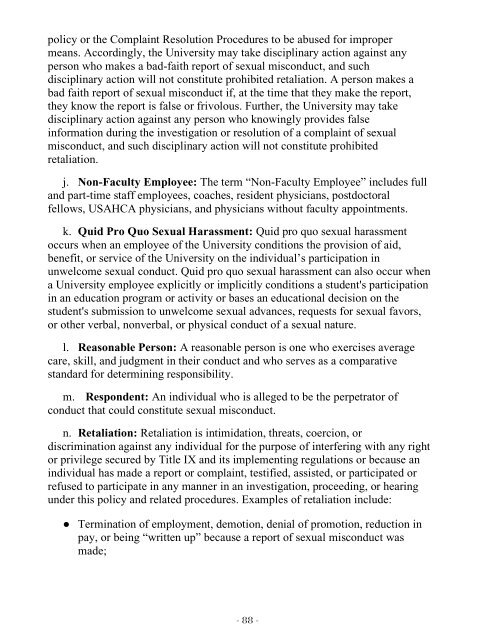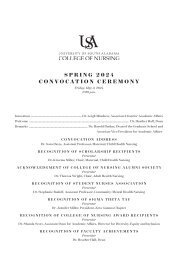The Lowdown 23-24
University of South Alabama Student Handbook
University of South Alabama Student Handbook
Create successful ePaper yourself
Turn your PDF publications into a flip-book with our unique Google optimized e-Paper software.
policy or the Complaint Resolution Procedures to be abused for improper<br />
means. Accordingly, the University may take disciplinary action against any<br />
person who makes a bad-faith report of sexual misconduct, and such<br />
disciplinary action will not constitute prohibited retaliation. A person makes a<br />
bad faith report of sexual misconduct if, at the time that they make the report,<br />
they know the report is false or frivolous. Further, the University may take<br />
disciplinary action against any person who knowingly provides false<br />
information during the investigation or resolution of a complaint of sexual<br />
misconduct, and such disciplinary action will not constitute prohibited<br />
retaliation.<br />
j. Non-Faculty Employee: <strong>The</strong> term “Non-Faculty Employee” includes full<br />
and part-time staff employees, coaches, resident physicians, postdoctoral<br />
fellows, USAHCA physicians, and physicians without faculty appointments.<br />
k. Quid Pro Quo Sexual Harassment: Quid pro quo sexual harassment<br />
occurs when an employee of the University conditions the provision of aid,<br />
benefit, or service of the University on the individual’s participation in<br />
unwelcome sexual conduct. Quid pro quo sexual harassment can also occur when<br />
a University employee explicitly or implicitly conditions a student's participation<br />
in an education program or activity or bases an educational decision on the<br />
student's submission to unwelcome sexual advances, requests for sexual favors,<br />
or other verbal, nonverbal, or physical conduct of a sexual nature.<br />
l. Reasonable Person: A reasonable person is one who exercises average<br />
care, skill, and judgment in their conduct and who serves as a comparative<br />
standard for determining responsibility.<br />
m. Respondent: An individual who is alleged to be the perpetrator of<br />
conduct that could constitute sexual misconduct.<br />
n. Retaliation: Retaliation is intimidation, threats, coercion, or<br />
discrimination against any individual for the purpose of interfering with any right<br />
or privilege secured by Title IX and its implementing regulations or because an<br />
individual has made a report or complaint, testified, assisted, or participated or<br />
refused to participate in any manner in an investigation, proceeding, or hearing<br />
under this policy and related procedures. Examples of retaliation include:<br />
● Termination of employment, demotion, denial of promotion, reduction in<br />
pay, or being “written up” because a report of sexual misconduct was<br />
made;<br />
- 88 -
















